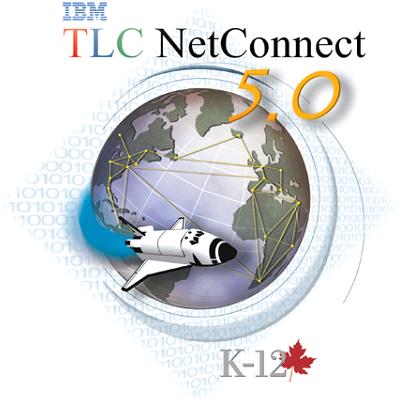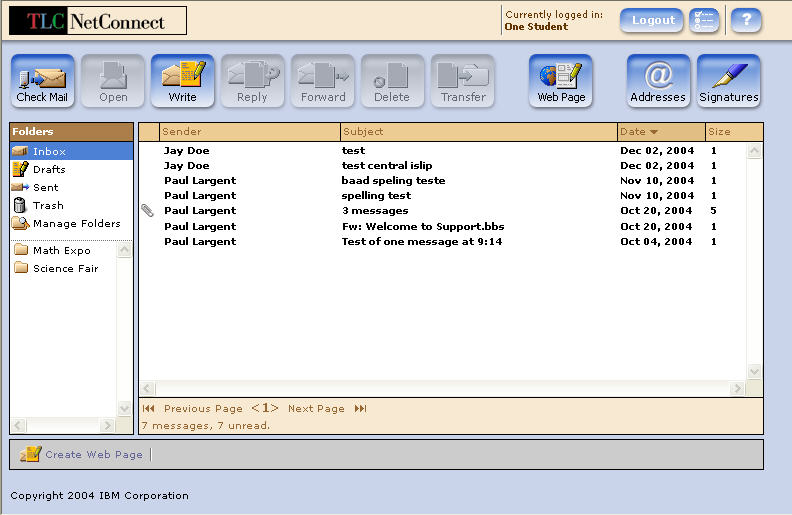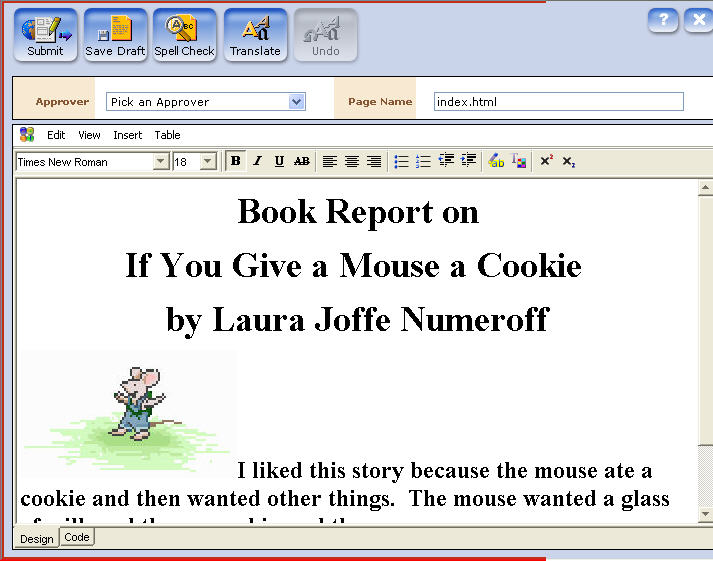
Features and Benefits
Overview of TLC
NetConnect V5
TLC NetConnect is IBM’s state-of-the-art Internet management
tool for K-12 schools which brings a host of features to the
modern classroom. These features benefit both the student
and the school district. TLC NetConnect is designed with
the school environment in mind. It gives the tools and
capabilities that students need to Surf the Web, communicate
with others and publish school projects for the whole web to
see. While at the same time providing the protection and
safeguards that the school administration need to monitor
the student’s compliance with their Acceptable Use Policy
and provide a safe working environment for the student to
learn in.
One of the
most important tools the Internet offers is E-mail.
People from around the world and in all walks of life use
E-mail. It is one of the first skills taught to any computer
user. TLC NetConnect makes E-mail easy by providing a unique
address for every person in the school and a user-friendly
interface for even the youngest students. Some features are
uniquely suited to helping students function in today’s
world. The ability to translate any message between English,
Spanish, German, Italian and French is available.
Management of
TLC NetConnect is easy and powerful. Administrators can
control the types of attachments that are allowed and can
control automatic deletion of most E-mail viruses. TLC
NetConnect also provides for both content filtering of the
E-mail messages and “Spam” filtering to reduce the
amount of irrelevant mail reaching the users. A “bad words” filter is included.
Tools are provided to manage student’s access to E-mail.
You can disable their ability to send E-mail, limit the
E-mail to just within the school or allow them to
communicate with anyone on the Internet.
The single
most popular use of the Internet is the World Wide Web. The
most popular and robust web server in the world
is built into TLC NetConnect. An industrial-strength “Caching Proxy” server
is provided
to improve performance. The Proxy also controls access to,
and protects students from, inappropriate web sites,
advertisements, pop-ups and web based viruses. The school
can easily configure where students can and cannot
get to, on the web. Students have
a new way of publishing their schoolwork. They can create
web pages using the Web Page Creator. The Web Page Creator is a simple
method of creating and publishing web pages.
Students can easily build a web page that include graphics
and pictures and submit it to a teacher for approval. The
teacher can then evaluate the work and publish the student’s
web page by clicking on just one button.
IBM’s TLC
NetConnect is a solution that is designed to fit well into
today’s 21st century K-12 schools.
TLC NetConnect uses IBM’s Industrial-strength components,
DB/2 and WebSphere, to provide Industrial-strength reliability and performance.
E-mail Server: Fully-featured E-mail service is provided using standard
SMTP and POP3 protocols. Written in Java, the TLC NetConnect E-mail system
includes such advanced features as Spam filtering and Content filtering of the
messages.
Web Server: Based on the Apache web server, the IBM HTTP Server allows
you and your students to publish web pages easily. There is no limit to the
pages can be hosted for the district and each school.
Proxy Server: Provides a safe environment for students by blocking access
to undesirable web sites. Through IBM’s web page caching technology you can
reduce your communications costs while improving performance. It will also
automatically pre-cache the most visited sites from the previous day. Use of the
proxy server is logged and detailed reports are generated each morning. The
reports show who went where on the web as well as showing which users were
prevented from getting to the undesirable sites.
Remote Support Tools: A variety of support tools are provided. These
programs help Bright Blue Software Technical Support and district technicians to
manage the technology from a central location. Upgrades can be performed
remotely.
Authentication Server: This service is used to synchronize E-mail
accounts and group memberships with a Novell DNS tree, a Microsoft ADS database
or other host with an LDAP database. This means that individual user ids do not
need to be maintained. When a user logs in they use the same ID and password
that they have to access the school LAN. Their credentials are authenticated by
your LAN server before they are allowed access to TLC NetConnect.
IBM Translation Server: This service can translate E-mails to and from
English, Spanish, French, or Italian. This is the same translation server used
by corporation and governments to enhance their communications.
Spam Check – All E-mail is reviewed to for spam content
and is compared against a global database of known spammers. Suspect messages
are quarantined where only administrators can see them.
Bad Words Filter – All E-mail is reviewed for use of crude, vulgar and
threatening language. Teachers or administrators can be alerted and they may
review these messages.
Student Web Use Reports – Every web page that a student accesses is
monitored and recorded. Reports are generated that detail what sites they visit
and what sites they are blocked from visiting.
Attachment Monitoring – all E-mail is scanned for dangerous attachment
types. Suspect files are stripped from the E-mail before it is delivered to the
user’s mailbox.
Students E-mail privilege – is determined by a teacher or administrator.
Some students may be allowed to communicate with anyone on the global Internet,
other students may be limited to emailing only students and teachers at their
schools, and finally some students may be limited to sending and receiving
E-mail with their teacher or not being allowed to send E-mail at all.
Script Virus Blocking – all E-mails are scanned by TLC WebMail when they are
opened. Any dangerous scripting is removed and can not be forwarded to other
users
Web Access to the World Wide Web is provided through
Netscape Navigator™, Internet Explorer™ or the open source browser, Mozilla. All
web access is monitored by the proxy server and reports are available on the web
pages accessed by each student.

TLC WebMail is a web based E-mail client has been created for the unique
requirements of the school environment. Students can use E-mail to collaborate
on class projects day or night with other students and their teacher. TLC
WebMail allows students and teachers access to their own individual and personal
E-mail account. TLC WebMail allows the sending and receiving of MIME compatible
messages within the school and around the world. The Windows client also
provides support for full HTML and font formatting of the messages.
TLC WebMail Web Page Creator

TLC Web Page Creator allows students, teachers and administrators to
create their own web pages. This tool is an intuitive word processor-like
application that can be used by your earliest grade levels. It also has advanced
features like tables, bookmarks, hyperlinks, common symbols, divider lines, text
styles, text attributes, text justification, bulleted lists, numbered lists,
inserting pictures from files and cutting and pasting from other sources like
word processors or web pages.
TLC Web Robot is a set of procedures that ensures that only approved
content is posted to the web server. Students must submit their completed web
pages to a teacher or administrator. The teacher must then review their work and
may choose to accept or reject their web page. A single mouse click will cause
the web page to be accepted and then TLC Web Robot automatically posts the page
to the web server. Once approved, the web page can be viewed by any student,
teacher or event a parent at home.
Unified Address Book keeps a list of all users and distribution lists.
The complete list of users is available while composing an E-mail so users do
not have to remember the IDs of the users they are communicating with.
Supported Client Environments include most modern browsers and operating
systems. These include the latest versions of Internet Explorer, Netscape
Navigator, Mozilla, Opera and other modern browsers running on operating systems
like Windows 98, 2000, XP, OS 9, OS X and Linux.